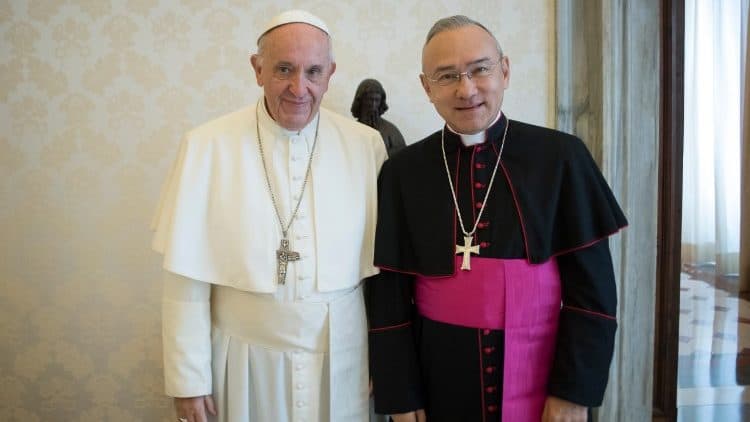ROME – In a decision that could set the stage for a decisive turn in the Vatican’s long-running “trial of the century,” the president of the Vatican’s tribunal ruled Thursday that although the pope himself cannot be called as a defense witness, the pontiff’s chief of staff, Venezuelan Archbishop Edgar Peña Parra, will appear.
The court also ruled that the president of the Institute for the Works of Religion, better known as the “Vatican bank,” French layman Jean-Baptiste de Franssu, also can be questioned.
Defense lawyers had also asked that Italian Cardinal Pietro Parolin, the Secretary of State and thus the pope’s top aide, be called to testify. The court reserved judgment on that request pending the results of Peña Parra’s testimony.
Both Peña Parra and de Franssu are expected to address a controversial $400 million real estate deal in London which is at the heart of the current trial. Thursday’s hearing was the 45th session of the trial since it began in July 2021, featuring ten defendants, including, for the first time in a Vatican criminal proceeding, a cardinal, Italian Cardinal Angelo Becciu.
Peña Parra’s testimony is considered especially crucial to the defense case, since theoretically it could undercut the credibility of the star witness for the prosecution, Italian Monsignor Alberto Perlasca. For ten years, from 2009 to 2019, Perlasca was head of the office for administrative affairs within the Secretariat of State, effectively making him responsible for the secretariat’s financial affairs.
When prosecutors began looking into the London deal, for which the Vatican eventually absorbed a loss of roughly $140 million, Perlasca was a prominent target of the investigation. In the middle of 2021, Perlasca instead volunteered to become a whistle-blower in the case, testifying against former colleagues and superiors, including Becciu.
In effect, Perlasca has attempted to describe himself as a victim of a scheme orchestrated by Becciu in league with unscrupulous Italian financiers, testifying last November: “Becciu made me do the things for which he’s charged in this trial … I’m not an accomplice, nor a conniver, nor an abettor.”
Yet in August 2021, Italian news outlets carried reports of a secret memorandum prepared for Vatican investigators in April 2021 by Peña Parra, who had been tapped by Pope Francis in October 2018 to take over from Becciu as the sostituto, or “substitute,” in the Secretariat of State, effectively the pope’s chief of staff.
Though the Vatican has never confirmed the authenticity of that memorandum, it’s never denied it either. In it, Peña Parra describes Perlasca as the key figure in a system within the Secretariat of State intended to pressure top officials into making hasty decisions about financial matters, effectively rubber-stamping decisions already made.
“It’s a mechanism in which the superior is put under pressure, pushing him to act quickly and predicting catastrophe, such as, ‘If you don’t sign immediately, you risk losing a lot of money,’ ‘We don’t have an alternative,’ ‘Don’t worry, the practice is fine,’ and ‘This is only a formality’,” Peña Parra wrote.
With regard to the star witness, Peña Parra said, “In daily meetings with Monsignor Perlasca, in response to my request for explanations he provided incomplete or partial information that were limited to attempts to justify operations that were already underway.”
Perhaps most damningly, the Peña Parra memo asserts that Perlasca himself signed two key documents authorizing the London deal “before the question had been submitted to the attention of the Secretary of State or the Holy Father,” meaning, effectively, that Peña Parra had presented his superiors with a fait accompli.
Should Peña Parra confirm those claims during examination at the trial, it could cast additional doubt on the credibility of Perlasca’s testimony, which has already been damaged, among other things by revelations that he was indirectly coached by Francesca Immacolata Chaouqui, an Italian PR consultant previously convicted of leaking confidential documents in the Vatileaks 2.0 scandal.
Speaking of Chaouqui, the Vatican tribunal also ruled Thursday that she will not testify again as originally planned on Feb. 16, after her first appearance at the trial Jan. 13. She had appeared along with Genoveffa Ciferri, a former analyst for the Italian Secret Service and a longtime personal friend of Perlasca, to discuss how Chaouqui and Ciferri had advised Perlasca in preparing several audio recordings he provided to prosecutors.
In effect, Chaouqui and Ciferri contradicted each other on virtually every point, making it impossible to know who was telling the truth. The president of the Vatican tribunal, veteran Italian jurist Giuseppe Pignatone, recognized as much, holding that further testimony from the pair would be “useless.”
“By now, their contrasting respective positions have been crystallized in repeated depositions,” Pignatone ruled.
On another front, the court also ruled that the current bishop of Ozieri in Sardinia and one of his predecessors will be called as witnesses, since Becciu is also charged with illicitly funneling Vatican money to charities in Ozieri run by his brother, who will also testify.
During Thursday’s hearing, Becciu replied to the claims of another former bishop of Ozier, Sergio Pinto, who died in December 2020, and who left behind personal papers in which he accused Becciu and other Vatican officials of “heavy interference” in the diocese. Becciu insisted there was no such pressure, insisting that Pinto never had any complaints until an unspecified personal incident caused a change of heart.












